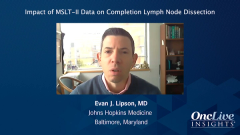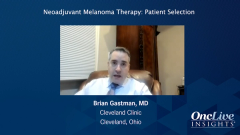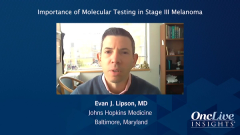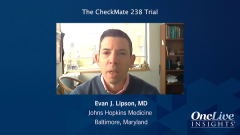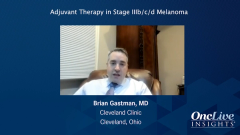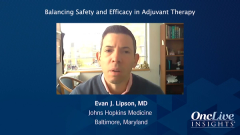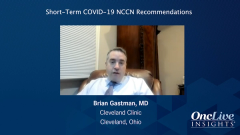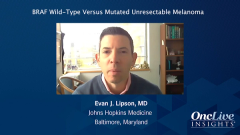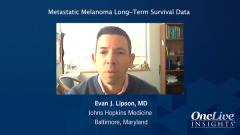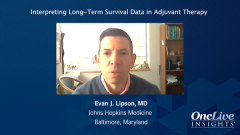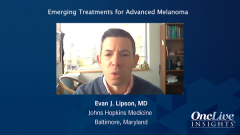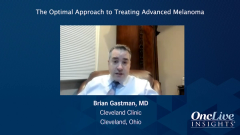
Short-Term COVID-19 NCCN Recommendations
Episodes in this series

Evan J. Lipson, MD: The National Comprehensive Cancer Network [NCCN], shortly after the COVID-19 [coronavirus disease 2019] pandemic arrived, put out some recommendations that gave some guidance about how to care for patients in the adjuvant setting with melanoma.
These recommendations were developed at a time when we knew a bit less about how the virus was transmitted, and it was a bit less clear about how we could keep patients and practitioners safe.
The guidance was important at that time, and it remains important. However, we now have a bit of a better bead on how to keep patients safe even when we’re performing surgeries and treating patients in the adjuvant setting.
One of the guidance points was that therapy may be initiated up to 12 weeks from the time of definitive surgical resection of melanoma. That’s standard; many of the trials include outpatients who were about 12 weeks out. Another recommendation was that adjuvant therapy should be deferred during the COVID-19 pandemic for patients with less than a 50% chance of disease relapse. Back in May or June of 2020 when these guidelines were being developed, that seemed reasonable. Now that we know a bit more about how the virus is transmitted and how we can keep patients safe, if you talked to a patient who was perhaps at slightly lower risk than that, they would still be in favor of initiating adjuvant therapy. The threshold is perhaps a bit higher than 50%. In any case, we are still thinking carefully about risk-benefit in the setting of COVID-19.
Another recommendation included choosing regimens that are the least taxing on the health system and the patient. That remains important for sure.
One recommendation was to use the extended dosing of nivolumab or pembrolizumab, so that would be nivolumab every 4 weeks or pembrolizumab every 6 weeks. That’s reasonable on many levels. You’re keeping patients out of the health care setting as much as you can, and as we’ve all ramped up our telemedicine capabilities, it’s easy to do a midcycle check-in at the 2-week or 3-week mark and have them get a set of blood tests locally. It is easy to be able to look at them via video and make sure they’re doing OK, so that we’re keeping them out of the health care setting.
Another point was that the BRAF/MEK inhibitors are a good option because they’re administered at home, so it again keeps patients out of the health care setting. For the appropriate patient with resected BRAF V600E or V600K melanoma, dabrafenib and trametinib is the evidence-based option, but the NCCN guidelines provided guidance that alternative BRAF/MEK inhibitors like encorafenib/binimetinib or vemurafenib/cobimetinib may be substituted if the drug supply is limited.
We, ourselves [at Johns Hopkins Medicine] have not run into that issue, but those recommendations are reasonable given the pandemic. Anything that can help with less frequent clinic visits, with less frequent infusions, and with increases in telehealth interval symptom checks are certainly are going to be helpful in keeping patients out of the risky settings of the health care environment.
Brian Gastman, MD: The impact of COVID-19 is happening now because it’s starting to impact our center. It’s not yet impacting cancer care, and quite frankly, even when we had the worst part of COVID-19 in April and May of 2020, it was probably the worst because of the unknown factors. We shut things down prophylactically, not because we were in the throes of it like New York.
The biggest thing that we noticed right away was that the screening for skin cancer went away all of a sudden. I was available, the hospital would let me operate, but there were no patients: literally nobody. I was there to work, but there were no patients to see me. If you think about it, unless it’s really obvious with a huge, painful, bleeding mass, if it’s a mole that is itchy and irritating with maybe a bit of blood, then in the throes of COVID-19, it may not prompt you to be seen.
I’m worried about that, these delays in therapy. Once the patient is diagnosed, the next big issue is that we get a COVID-19 test on everybody. I’ve had a couple of positive patients [at the Cleveland Clinic], but not many, which is shocking given the number of cases of COVID-19 in my state, whose visits have been cancelled because of COVID-19. The next question is this: what do you do with it? What happens if they are persistently positive? Should you stop testing? This is the Cleveland Clinic formulation, and it may be so at many hospitals, once the patient is past a certain number of days of asymptomatology.
It also creates a bit of fear and trepidation in the staff as well. From the standpoint of both adjuvant therapy and regular stage IV immunotherapy, there are patients who sometimes need to be rehabilitated after surgery, or they are just not strong enough. You would normally send them to a skilled nursing facility, but right now, those places feel scary to most people and their families, so a lot of that has had a change in paradigm. Despite the fact that patients may not have ever gotten COVID-19, there is something about the environment that we are living in right now that is somewhat depressing, and it chronically weighs on patients. I feel that I’m seeing more negative outcomes with melanoma, certainly in the stage IV setting, than I normally would have seen last year or the year before.
This is without scientific rigor; this is just empiric information, but I worry that where there is smoke, there is fire. There is something about COVID-19 in general. I also treat oral cavity cancer, and I had a patient who came in with oral cavity cancer. She was in her 80s, and her husband had just died of COVID-19. The effect that all that stress has on patients with cancer could lead to worse outcomes. This is on top of the idea that you have cancer and have COVID-19. That’s a whole other discussion that I don’t have much experience with, thankfully. Living with COVID-19 has been very tough on our patients.
Evan J. Lipson, MD: Here at [Johns] Hopkins [Medicine], this has, in many ways, been the epicenter of COVID-19 data. When you turn on CNN you’re always hearing statistics as reported by Johns Hopkins University, so we, like everybody else, have been very tuned into what the ebbs and flows of the virus are. We’ve followed many of our academic colleagues in masking and face-shielding protocols to keep ourselves and our patients safe. In doing so, the patients have appreciated being able to come into an environment that is relatively protected. With some exceptions, we don’t allow visitors into the hospitals in most cases. We’re minimizing the number of patients who can be in a waiting room at any given time. We make sure patients are socially distanced while they are there.
At my own clinic, we are prohibited from double-booking, which has been nice for us. It’s streamlined the flow of patients in clinic to keep everybody safe. In that way, we’ve done our best to mitigate the risk.
In terms of patients’ enthusiasm for embarking on these various therapies, we’re now seeing that we know a bit more about how to control the spread of the virus so that patients are more willing to come into our cancer center and be engaged in clinical trial participation. That was not happening as much at the beginning of the pandemic because we weren’t as comfortable with what it meant to keep patients out of harm’s way. As we’ve been able to open up again, we’re getting more toward normal.
We still certainly abide by the NCCN recommendations to try to minimize the frequency of clinic visits and the frequency of infusions. We use telehealth when we can and when it’s appropriate. We make sure that we’re checking in on patients for symptom monitoring, and we get outside laboratory tests when we have to so that we’re not bringing patients onto the Hopkins campus. We’re finding creative ways to keep patients safe.
Transcript edited for clarity.


